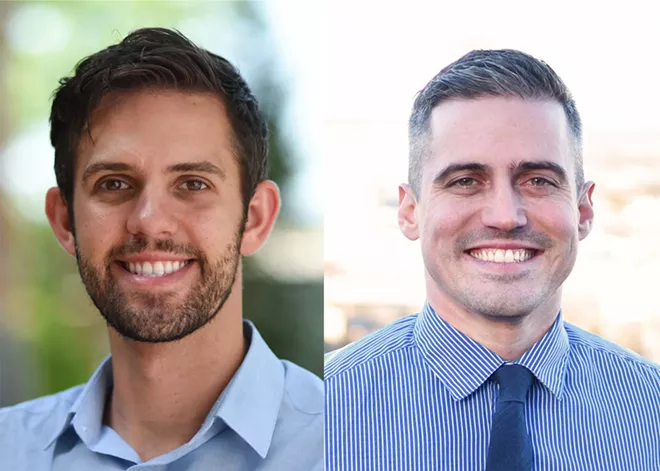Spokane City Council's legislative session went off script(ure) Monday, as council members paused public comment to debate whether or not to allow far-right Caleb Collier and his associates to use open forum time to read from the Bible's Gospel of John. Council rules give public commenters two minutes to talk about anything related to "affairs of the city." Collier — a former Spokane Valley council member and close ally of fringe former state Rep. Matt Shea — put those rules to the test as he began reading. "Is this related to city business?" Council Member Zack Zappone asked, interrupting the second speaker. Council Member Jonathan Bingle argued that the speakers should continue. "This is a way that we help to determine our beliefs and views," he said. After lengthy debate, council members decided to continue, with a plea that the speakers at least tangentially try to connect the readings to city business. All told, the Bible readings and debate ate up 20 minutes of public meeting time. (NATE SANFORD)
PLEASANT PRIZE
An interchange that's been in the works for two decades is much closer to becoming a reality. The Federal Railroad Administration has awarded up to $36 million to Idaho's Transportation Department to help build a bridge over the train tracks at Pleasant View Road to connect with State Highway 53 north of Post Falls. The project would eliminate the need to cross the busy train tracks near BNSF's switching yard in Hauser in order to get to the highway. Three other at-grade crossings in the area will be closed once the interchange is finished. Idaho, BNSF and the Post Falls Highway District will contribute a 20 percent funding match for the project. The crossing sees 46 trains per day and an annual average of 6,000 vehicles per day, according to federal data. The project will expand and move the highway farther north of the tracks and will expand Pleasant View Road. The bridge work was slated to start in 2028, but the grant means it could start sooner. (SAMANTHA WOHLFEIL)
FIGHTING OLD CONVICTIONS
In February 2021, Washington's Supreme Court found the state's drug possession law to be unconstitutional as it didn't require prosecutors to prove someone "knowingly possessed" drugs. The state estimates more than 200,000 felony drug convictions could be vacated due to that ruling. Since 2017, the Seattle-based legal empowerment organization Living with Conviction has helped people get their court-mandated legal financial obligations (fees assessed for certain crimes) waived or reduced. Now the organization is helping people figure out if their drug possession felony can be vacated and if they can ask for refunds for those legal fees. People can call 206-307-3028 for free guidance from formerly incarcerated peers who may refer people to attorneys or guide them on how to file their own request. "If they don't have any other felonies on their record ... it would make it much easier for them to get housing, employment, etc.," says Deborah Espinosa, the organization's executive director. "LFO refunds can be incredibly powerful. It's the ability to get some more money back in their pockets, and I also think that it's really holding the state accountable." (SAMANTHA WOHLFEIL)

















